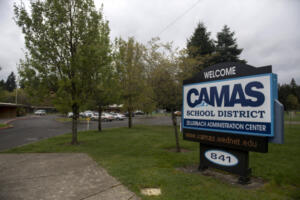Camas could become the first community in Southwest Washington to reverse its water fluoridation efforts.
The Camas City Council on Monday voted 4-2 to instruct the city’s attorney to draft an ordinance that would, if approved by a majority of the council, halt the city’s 60-year-old practice of adding fluoride to its public drinking water system. (Fluoridation aims to protect residents’ health by preventing dental cavities.)
On Monday, council members John Nohr and John Svilarich voted against advancing the anti-fluoride ordinance, while council member Tim Hein spoke in favor of reversing the city’s fluoridation practice.
“I don’t believe the general population should be exposed to fluoride if they don’t want to,” Hein said. “I do believe fluoride works. I believe it should be up to those who want it to get it.”
The council’s vote followed a public hearing that drew nine in-person and online speakers and at least 39 written comments — 28 of which called for the city to halt its fluoridation practice.




